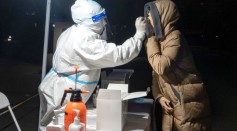hemorrhagic fever

Lockdown Again? China's Xi'an Residents Ordered to Remain Indoors Beginning Today as the City Faces Dual Epidemic Threats
CDC Announced Deadly Hemorrhagic Fever Can Now Spread Between People
Health Officials Believe They May Have Found Source of Newest Ebola Outbreak
In United States 21 Days Signals Waning Ebola Infection
WHO Predicts Ebola Outbreak Could Worsen by 1000% as Soon as December
Most Popular

How Technology Is Changing the Real Estate Industry?

How a Plant-Based Diet Can Protect Against Breast Cancer: Insights from Nutrition Research

Study Reveals High Turnover in Scientific Research Careers: What This Means for Future Scientists

Why It's So Difficult to Lose Weight: The Biological Explanation Behind Obesity






